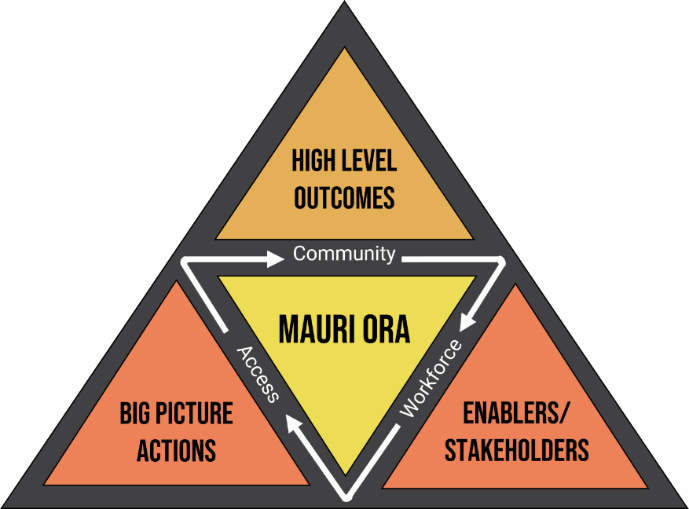From Surviving to Thriving: A Call For Action
Opinion Editorial written by Dr. Nethmi Kearns - Public Health Medicine Registrar
Transformative Change Framework for Mauri Ora in Porirua. This framework illustrates how high-level outcomes, big picture actions, and enablers/stakeholders work together, driven by access, workforce, and community connections to achieve Mauri Ora: complete health and well-being for all in Porirua.
Aotearoa New Zealand’s health and well-being system is under immense pressure. Decades of chronic underinvestment have resulted in cumulative decline. Our hospitals are overwhelmed, our health workforce is stretched thin, and our primary care services are struggling to keep up.
Despite efforts to address health inequities, too many communities, particularly in Porirua, still face systemic barriers that prevent them from living well. Short-term, reactive approaches dominate our system, prioritising immediate fixes over long-term, sustainable solutions. Too often, our health system operates as a “patch and dispatch” service: treat the crisis, then discharge people back to cold homes, empty cupboards, and the same cycle of illness. It’s costing lives.
We can no longer afford a system that treats symptoms while ignoring the causes. Poor housing, energy hardship, food insecurity, and systemic racism all undermine health outcomes. When whānau do not have stable housing, warm homes, or nutritious kai, their physical, mental, and social well-being suffers.
We Need an AND-AND Approach
It’s time to move beyond “either-or” thinking. We must prioritise both acute care and the prevention of illness. This means shifting to a community-led, integrated approach that tackles the social determinants of health head-on.
A Holistic Vision for Well-being
At Te Wāhi Tiaki Tātou, we believe well-being is built through strong communities, not just hospitals and medicines. This includes:
Housing as a health priority: Every whānau deserves a secure, affordable, and healthy home.
Equitable energy access: No one should have to choose between heating their home or feeding their tamariki.
Kai security: Nutritious food should be a basic right, not a privilege.
Cultural safety in healthcare: Services must reflect and respect Māori and Pasifika worldviews.
Partnership-driven change: Real change comes when government, iwi, community organisations, and funders work together.
Aotearoa’s commitment to Pae Ora (Healthy Futures) offers a critical opportunity to transform our health system, but policy alone isn’t enough. We need long-term and sustained investment, authentic partnerships with communities and the courage to challenge the status quo. Local and national decision-makers must back intersectoral solutions, listen deeply to communities, and support innovative models that empower whānau to lead their own well-being journeys.
Join the Movement
Te Wāhi Tiaki Tātou is ready to lead, but we cannot do it alone. We invite funders, policymakers, and community leaders to join us in reimagining health and well-being in Porirua. Let’s build a system where every person, whānau, and community doesn’t just survive but truly thrives.
#PoriruaCommunityPower#PoriruaThriving#ReimaginingPorirua
Real Change Starts in the Community: Leilani’s Story
WELLfed Gardens in Cannons Creek Porirua
The power of a community-led, holistic approach is best seen in the story of Leilani, a 50-year-old Pacific woman living in Porirua with her husband and young son.
For over two decades, Leilani lived on a benefit. Six months ago, she weighed 260kg, required insulin for Type II diabetes, and rarely left her home. She had lost motivation, spent most of her time on the couch, and struggled with basic daily tasks. Like many others, her circumstances were shaped by a lack of access to nutritious food, stable employment, and meaningful support systems.
That changed when Leilani joined the WELLfed Diabetes Programme, a community initiative enabled by Te Wāhi Tiaki Tātou that focused not only on managing diabetes, but on addressing the underlying determinants of health:
Kai security: Leilani learned how to prepare healthy, affordable meals using fresh produce from the community garden.
Life skills and education: She joined WELLfed’s workshops on cooking, budgeting, CV writing, and is now studying for her learner's licence.
Social connection and confidence: Through a welcoming environment, she rebuilt her confidence and began re-engaging with her community.
In just two terms, Leilani lost 130kg, reduced her smoking from a pack a day to just three cigarettes, and is now working part-time. Most importantly, her transformation has inspired her son—who once saw benefits as a future—to now aspire to paid employment and independence.
Leilani’s story is a powerful reminder that health doesn't begin in hospitals, it begins in homes, kitchens, classrooms, and communities. When we invest in community-based solutions that tackle the causes, we create lasting change that ripples across generations.



